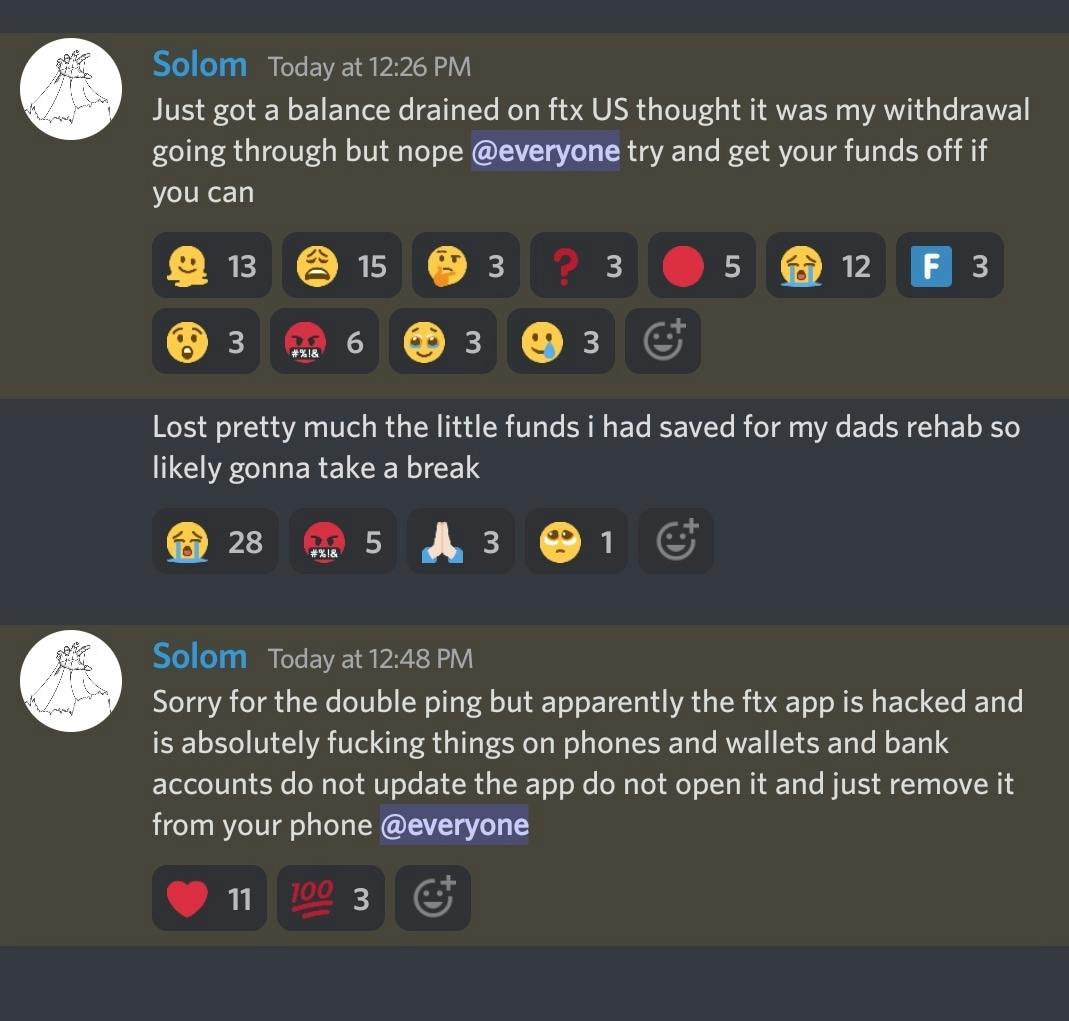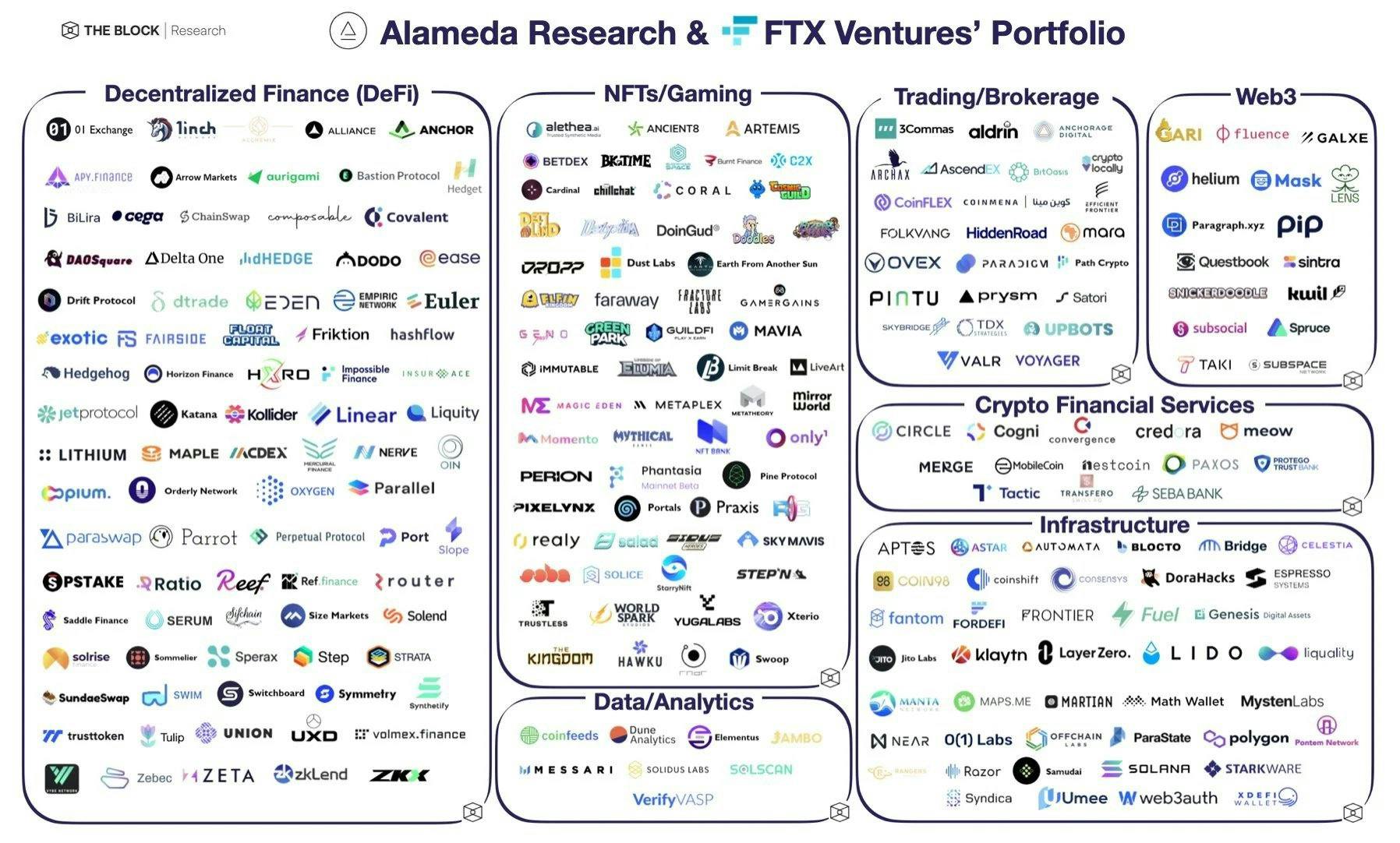Table of contents
- Introduction
- Luna Crash
- What is FTX Exchange?
- The News of FTX Insolvency
- What Caused FTX Insolvency?
- FTX Files For Bankruptcy
- Hacker Drained $600 Million from the Exchange
- The contagious effect of FTX bankruptcy on the Crypto Market?
- Is there still a Future for Crypto Market?
- What Crypto Exchanges Need to Do?
- Bottomline
Introduction
Last week was one of the most dramatic weeks in the crypto industry's history. The Crypto market lost over $100 Billion in a single day 😩
You've earned your stripes if you survived this year's crypto bear market.
The overnight collapse of FTX has made many VCs and retail investors sad and frustrated. Many now truly realized that not your keys 🔑, not your crypto.
If the second largest crypto exchange can fall, trust no centralized exchange.
Luna Crash
The Luna saga kick-started the entire crypto collapse when Terra Labs lost close to $70 billion, and the Terra ecosystem collapsed.
The contagious effect of Terra/Luna collapse made some VCs and exchanges exposed to Luna also collapse, Three Arrow Capital (3AC), Celsius, Voyager, Hodlnaut, and BlockFi. And Babel finance etc.
In this article, I will explain why FTX collapsed and the contagious effect this will have on the crypto market and the African Fintech industry.
What is FTX Exchange?
FTX is a centralized global cryptocurrency exchange founded in 2019 by Sam Bankman-Fried and Gary Wang.
FTX claimed that it is an exchange founded by traders for traders to enjoy the riches in crypto trading. It also supports more than 300 cryptocurrencies, a huge number compared with some competitors.
One of the early backers of FTX was the competing exchange Binance. In December 2019, they became a strategic backer of FTX. However, as of July 2021, the two exchanges have parted ways, likely because of their competing platforms.
The News of FTX Insolvency
The news of the FTX exchange started two weeks ago when an insider from the FTX team leaked their balance sheet to Coindesk, a crypto news agency, but nobody believed what Coindesk was saying concerning FTX; people count it as a lie.
However, last Sunday, CZ, the CEO of Binance, tweeted that his company was selling its FTT holdings, worth about $500m, because of “recent revelations that have come to light.”
The value of FTT, the native token of FTX collapsed, and FTX customers started withdrawing funds in a bank-run-style exodus.
In a message to staff this week, cited by Reuters, Bankman-Fried said the firm suffered a “giant withdrawal surge” as users rushed to take out $6bn (£5.1bn) in crypto tokens from FTX over three days. Daily withdrawals usually ran to tens of millions of dollars, Bankman-Fried told his employees.
Zhao then stepped in to rescue FTX, agreeing last week Tuesday to buy the company but then announcing a day later that he was stepping away from the deal. “The issues are beyond our control or ability to help,” Binance said, citing discoveries in the due diligence process and the launch of regulatory investigations in the US.
What Caused FTX Insolvency?
The Wall Street Journal reported that FTX had loaned $10bn of customer funds to Alameda to gamble with, a substantial proportion of the exchange’s $16bn in assets.
The day before FTX.com filed for bankruptcy, Sam Bankman-primary Fried’s international crypto exchange had just $900 million in liquid assets versus $9 billion in liabilities, according to investment documents received by FT.
The majority of those liquid assets, which were included on an FTX international balance sheet dated Thursday, comprised $470 million in Robinhood shares owned by a Bankman-Fried corporation that wasn’t included in the bankruptcy filing on Friday with 134 other corporate entities.
FTX bears a $9 Billion hole in its balance sheet, which Sam has failed to meet, even after dire attempts to ink deals with noteworthy crypto organizations and individuals.
The Downfall of FTX is perhaps the most devastating the crypto world has ever seen, and its CEO is paying the price. Bloomberg’s Billionaire Index is now reporting that Sam Bankman-Fried’s once $16 billion net worth is now $0.
FTX Files For Bankruptcy
Lady week Friday, SBF tweeted that he is sorry for everything that has happened and has filed FTX, FTX US, and Alameda for voluntary Chapter 11 proceedings in the US.
This tweet made people who have funds on the exchange to be devastated. Investors knew they might be unable to retrieve their funds from the exchange.
Hacker Drained $600 Million from the Exchange

 FTX officials appeared to confirm rumours of a hack on Telegram, instructing users to delete FTX apps and avoid its website.
FTX officials appeared to confirm rumours of a hack on Telegram, instructing users to delete FTX apps and avoid its website.
More than $600 million in crypto left bankrupt crypto company FTX’s wallets late Friday with little clear explanation. Soon afterwards, FTX stated on its official Telegram channel that it had been hacked, instructing users not to install any new upgrades and to delete all FTX apps.
According to on-chain data, various Ethereum tokens and Solana and Binance Smart Chain tokens have exited FTX’s official wallets and moved to decentralized exchanges like 1 inch. Both FTX and FTX US appear to be affected.
The contagious effect of FTX bankruptcy on the Crypto Market?
 Changpeng Zhao’s warning that the fall of FTX will have “cascading effects.” A crisis could be on the horizon, with the falling crypto platform as the first domino.
Changpeng Zhao’s warning that the fall of FTX will have “cascading effects.” A crisis could be on the horizon, with the falling crypto platform as the first domino.
Since the crisis at FTX began, bitcoin has plummeted from $20k a coin to $15.5k, its lowest value since 2020.
Big companies and protocols exposed to FTX have to prove their own liquidity.
On Nov. 11, 2022, Galois Capital co-founder Kevin Zhou told their Clients in a letter that half of the Company’s Capital Got Stuck on FTX.
Crypto investment firm Paradigm has told its limited partners that it marked down its investment in now bankrupt exchange group FTX to zero following its liquidity meltdown,
Canada’s Teacher’s Pension Fund Faces Investment Issue in FTX’s Liquidity Crunch. The fund invested an undisclosed amount in the company during a $420 million funding round last October.
Crypto trading firm Genesis has disclosed that around $175 million of its funds are locked away in an FTX account. The company announced this news on Twitter in an attempt to maintain transparency.
Venture capital firm Sequoia Capital said it would mark down its $214 million investment in FTX to zero after a run on the exchange in recent days blew a massive hole in its balance sheet and cast serious doubts over its survival.
The collapse also affected FTX’s blue-chip backers, including BlackRock, SoftBank, and hedge fund billionaires Paul Tudor Jones and Izzy Englander.
Is there still a Future for Crypto Market?
The financial system’s resilience of the crypto market has been tested over the past 12 months with the onset of a new “crypto winter”.
The second-largest centralized crypto exchange collapsed overnight yet the crypto industry is still standing strong.
Lastly, all that has happened has shown people that self-custody of assets is the only way to survive because not your keys 🔑 not your crypto.
Crypto has a future, and it tends toward total decentralization.
What Crypto Exchanges Need to Do?
Exchanges should learn from FTX's downfall and take the following steps.
Stay away from overleveraging.
Avoid using their native token as collateral.
Avoid borrowing funds.
Have a large reserve.
All crypto exchanges should do Merkle tree proof-of-reserved to enhance transparency.
Binance has done it on Merkle-tree proof of reserves, showing the assets they have in their custody. Also, Crypto.com has released its own.
However, proof of reserves of exchanges shows their assets; what about the liabilities they may have? Liabilities should be included in their proof of reserves.
If proof of reserves is done well, it will help centralized exchanges from going bankrupt and may boost people's confidence in the exchange's solvency.
Bottomline
We have seen that there are a lot of bad actors in the crypto space, but that doesn't mean that crypto is bad. No matter the problem that crypto faces, it is going to overcome it.
Every drama in the crypto space this year has taught us one lesson "Not your keys, not your coin".
Users should not rely on centralized exchanges to secure their assets because the centralized exchanges have failed us times without numbers.
